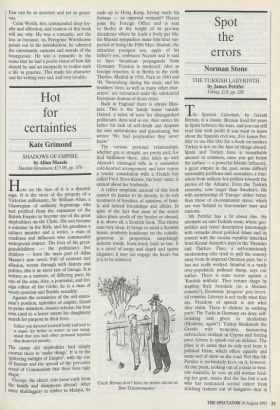Hot for certainties
Kate Grimond
SHADOWS OF EMPIRE by Allan Massie Sinclair-Stevenson, £15.99, pp. 370 Here on the face of it is a dynastic saga. It is the story of the progeny of a Victorian millionaire, Sir William Allan, a Glaswegian of ordinary beginnings who had profited from the expansion of the British Empire to become one of the great shipbuilders on the Clyde. His son became a minister in the Kirk, and his grandson a cabinet minister and a writer, a man of erudition and influence who commanded widespread respect. The lives of his great- grandchildren — the politician's five children — form the main part of Allan Massie's new novel. Full of contrast and allusion, woven through with history and politics, this is no mere tale of lineage. It is written as a memoir, of differing pace, by one of the sons, Alec, a journalist, and for- eign editor of the Globe; he is a man of weary cynicism and flexible sexuality. Against the certainties of the old states- man's position, upholder of empire, friend to prime ministers, classics scholar, his four sons (and to a lesser extent his daughters) search for purpose in their lives:
Either you devoted yourself body and soul to a cause, for better or worse: or you recog- nised that you had other personal loyalties that deserved priority.
The canny old shipbuilder had simply exorted them to 'make things'. It is in the `guttering twilight of Empire', with the rise of fascism and the spread of the pervasive creed of Communism that their lives take shape. George, the eldest, cuts loose early from the family and disappears abroad. After some skulduggery in rubber in Malaya, he ends up in Hong Kong, having made his fortune — an imperial remnant? Hector joins the Foreign Office and is sent to Berlin at the height of its pre-war decadence where he leads a lively gay life; his Marxist sympathies make him later sus- pected of being the Fifth Man. Alastair, the attractive youngest son, apple of his father's eye, embraces Nazism and is said to have broadcast propaganda from Germany. Treason is muttered. Alec as foreign reporter, is in Berlin in the early Thirties, Madrid in 1936, Paris in 1940 and '44, Nuremberg during the trials, and his brothers' lives, as well as many other char- acters', are recounted amid the substantial European dramas of those cities.
Back in England there is always Blan- kets. This is the family home outside Oxford, a salon of sorts for distinguished politicians, dons and so on. Alec envies his father his lack of self-doubt and despises his own ambivalence and questioning, but writes: 'We had perplexities they never knew.'
The various personal relationships, whether gay or straight, are pretty arid; few find fulfilment there. Alec takes up with Alastair's estranged wife in a somewhat cold-hearted arrangement, and later enjoys a tender consolation with a French boy called Fred. Even Kirstie, the boys' sister, is cynical about her husbands.
A rather simplistic account of this book cannot do justice to its density, to its rich treatment of loyalties, of opinions, of fami- ly and indeed friendships and affairs. In spite of the fact that most of the action takes place south of the border or abroad, it is, above all, a Scottish book. This theme runs very deep. It brings to mind a Scottish house, sombrely handsome on the outside, generous in proportion, surprisingly delicate inside, book-lined, built to last. It is a novel of scope and depth and sparse elegance; it may not engage the heart, but it is to be admired.
`Uncle Remus don't have no stories about no Brer Tyrannosaurus.'


























































 Previous page
Previous page